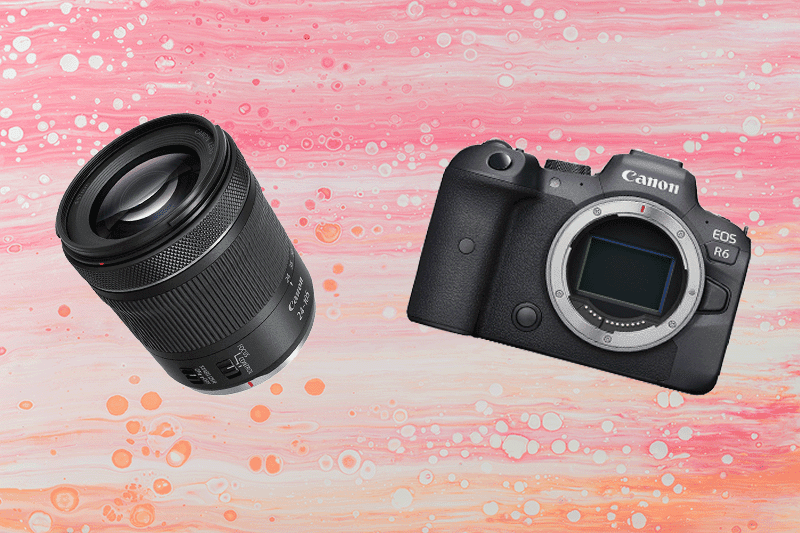Mirrorless cameras are here to stay and Canon is breaking ground with just what mirrorless lenses are capable of. If you’ve picked up a new Canon EOS R6 mirrorless camera, you might be asking yourself: What lenses for Canon R6 should I get first?
The best lenses for Canon R6 are going to meet your needs and your budget. We’ve rounded up the best of the best from budget-friendly lenses to the specialized and high-end.
Introducing the Top 7 Lenses For Canon EOS R6 Cameras!
- Canon RF 24-105mm f/4-7.1 IS STM Lens (Best Lens for Canon EOS R6)
- Canon RF 50mm f/1.8 STM Lens (The Best Budget Lens for Canon R6 Cameras)
- Canon RF 70-200mm f/2.8 L IS USM Lens (Best Telephoto Lens for Canon EOS R6)
- Canon RF 100mm f/2.8 L Macro IS USM Lens (Best Macro Lens for Canon EOS R6 Mirrorless Cameras)
- Canon RF 15-35mm f/2.8 L IS USM Lens (Best Wide-angle Lens for Canon R6)
- Canon RF 85mm f/1.2 L USM DS Lens (Best Prime Lens for Canon EOS R6)
Let’s dive into the 6 best Canon EOS R6 lenses!
1. Canon RF 24-105mm f/4-7.1 IS STM Lens: Best Lens for Canon EOS R6
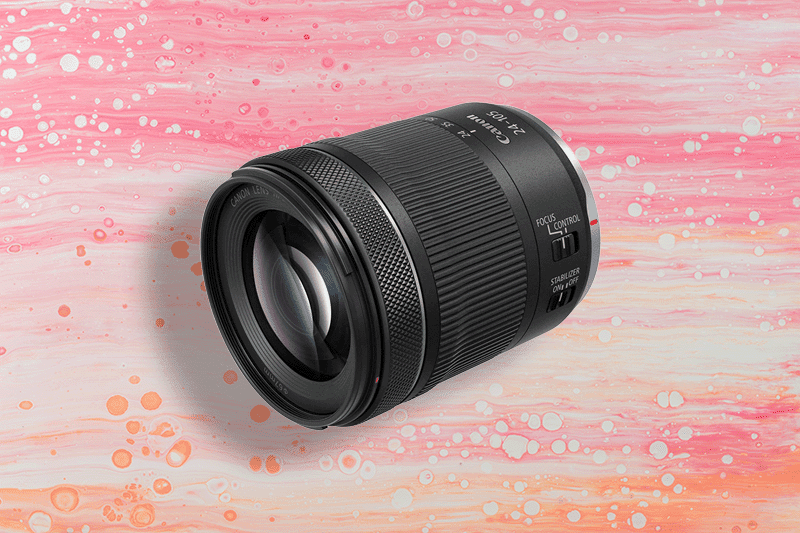
The Canon RF 24-105mm f/4-7.1 is one of the best lenses for EOS R6 cameras. In fact, it’s so good it gets our number one spot. Let’s take a closer look at why this lens beats out the others for our number one pick.
The first thing that we have to look at it’s just how well-balanced this lens is. The focal length ranges from 24 to 105 mm which can serve everyone from landscape photographers to people doing street photography and portraiture.
The f/4 aperture is definitely a downside when it comes to shooting in low-light conditions, but it’s also serviceable for most photography situations. You might want to switch out lenses if you’re heading to a dimly-lit event, or you’re trying to shoot at night, but this is a good aperture for working in well-lit indoor environments and the outdoors during the day.
Canon’s stepping motor as well as the built-in image stabilization make this an excellent choice for individuals who are shooting video as well as photography. This lens is poised to be one of the best all-around lenses for Canon’s new mirrorless line of cameras.
This lens also features a specialized Center Macro Focus which is capable of 1:2 magnification. No, this won’t replace your professional macro lens, but it will give you unique capabilities that you just don’t see in your average Canon lens.
Think about the Canon RF 24-105mm f/4-7.1 lens as an all-around great lens that does everything from wide-angle to macro.
The budget-friendly cost might not be the cheapest Canon has to offer, but it will make sure you don’t feel so bad when throwing this in your travel bad either.
The seven-bladed diaphragm also creates high-quality bokeh. This won’t be competing with the Helios lenses, but it will give you great shots on a lens that is capable of this and so much more.
Now, we should address some of the downsides that come with this lens.
The biggest downside is that this is not part of Canon’s L series of lenses. This means that you’re going to get a lower build quality, more plastic components, and most importantly no weather sealing. You should be extra careful or buy a lens cover when shooting outdoors in the rain or in dusty environments.
The aperture is also going to hold back what you’re capable of with this lens when it comes to nighttime photography. We wouldn’t necessarily recommend this one if you’re getting paid to shoot someone’s wedding, or you have the opportunity to switch out to a lens with a better aperture for low-light conditions.
Pros
- Affordable
- Covers wide-angle to short telephoto lengths
- Stepping motor and image stabilization
- Customizable control ring
- Viable as a budget macro lens as well
Cons
- No weather sealing
- Limited aperture
2. Canon RF 50mm f/1.8 STM Lens: The Best Budget Lens for Canon R6 Cameras
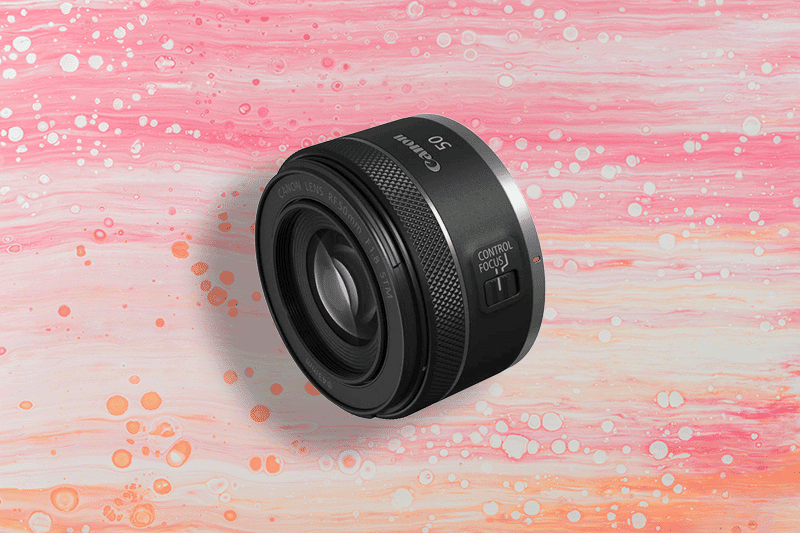
What does it take to be the best budget lens for Canon R6 cameras?
A lens would need to be versatile, offer crystal clear images, and do it all at a fraction of the cost of Canon’s high-end lenses.
The Canon RF 50mm f/1.8 lens handles all of this with ease.
Canon is notorious for making extremely high-quality lenses that have slim profiles. To date, none of Canon’s competitors tackle this specific lens niche quite as well. In a world where Canon feels one step behind the mirrorless camera game, it’s good to see that they are still strides ahead when it comes to glass.
By a wide margin, this is the most affordable lens you can get for a canon mirrorless camera. Any cheaper than this and we’re looking at lenses with plastic, well, lenses!
This makes it great for anyone looking to jump into photography without the price tag. You can start off shooting street, portraits, or even video with this lens. Remember, if you build up pro skills, you can take pro-level pictures on just about any lens.
However, this budget doesn’t mean low quality. This lens can take pictures that are ready for art galleries or paying clients. The lens has been designed with a Super Spectra coating and a single aspherical element to help reduce distortions.
It’s also got a 7-bladed diaphragm and an f/1.8 aperture, and you know what that means—buttery smooth bokeh! This lens is an all-star for low-cost portraiture and street photography.
Lenses don’t last forever. They can break, grow fungus, or get scratched. Nothing ruins a photo shoot like a damaged lens. Grab an RF 50mm f/1.8 STM lens for your Canon R6, and you’ll always have a backup on hand!
As for the downsides, they are mostly what you’d expect as trade-offs for a highly budget-friendly lens.
There’s no weather sealing at this price point. We would suggest keeping this lens out of tough weather, but at this price point, you can feel safe playing around and letting this lens take a hit or two. Let that budget cost give you the freedom to get adventurous with your photography.
The biggest downside with this lens is the novelty factor. It’s cool, it’s streamlined, but it’s not a pro-quality lens. As you upgrade to L series lenses, you might find this one playing emergency backup to your high-quality lenses.
Pros
- Easily the most affordable lens that Canon offers for Mirrorless cameras
- Ultra-compact design that can be left on your camera whenever you’d like
- 50mm and f/1.8 is a great combination for a basic prime lens
- Super Spectra Coating and one aspherical element
Cons
- Not weather sealed
- Becomes more of a novelty as your lens kit expands
3. Canon RF 70-200mm f/2.8 L IS USM Lens: Best Telephoto Lens for Canon EOS R6
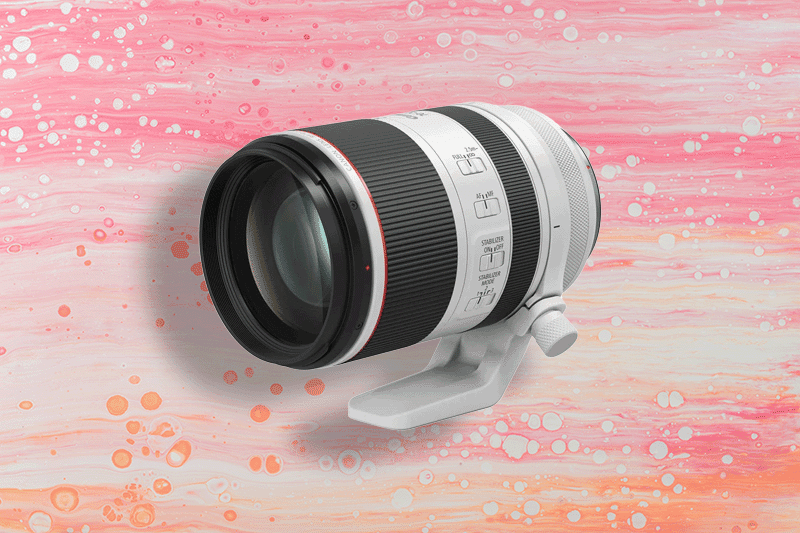
The best telephoto lens for Canon EOS R6 cameras needs to deliver on a great range of focal lengths without dropping performance across that range. The Canon RF 70-200mm is one of the best telephoto zoom lenses out there.
Canon continues to put all of their efforts into their new mirrorless photography lenses, and it really shows on the Canon RF 70-200mm.
What you’re going to notice first about this lens is just how light and nimble it feels in your hand. If you shot with the old DSLR 70 to 200 mm lenses, you’ll remember just how bulky and awkward they could get.
This was a huge problem when mirrorless cameras first became the norm. They were small and streamlined which made them feel extra cumbersome when paired with these gigantic lenses. Canon has made their smallest 70 to 200 millimeters to date which is the perfect counterbalance to the R6.
This lens also meets the exacting standards of the Canon L-series of lenses. It’s got rugged weather sealing that even features shock resistance. That combined with several coatings and elements makes this a durable go-to lens.
This lens also comes packed with all the features you would expect from a high-end telephoto zoom lens. You have a focus limiting selector, image stabilization mode selector, and the ever-present removable tripod ring mount.
This means you can dial in the exact specifics you need for precision photography. This is the perfect pairing with all of the additional features and controls that come with mirrorless cameras. The R6 70 to 200 mm lens gives you precision even at a distance.
Being the best zoom lens for Canon EOS R6 doesn’t mean that you don’t have any drawbacks.
One of the biggest drawbacks to this lens is that it’s going to cost you nearly as much as you paid for your Canon R6 camera. This is a considerable financial investment in your photography. This might even be a little out of the price range for individuals who aren’t working professional photographers.
The other drawback comes with the fact that this lens is 70 to 200 mm for the focal length. This means that you’re going to need another lens or two below 70 mm to round out your photography kit. This is especially important if you’re looking to do events or anything else that needs wide-angle coverage.
Pros
- Super UD element, UD element, and two aspherical elements
- Air Sphere and Fluorine coatings
- The dual Nano autofocus system
- Lightest Canon 70-200mm lens ever made
Cons
- Very heavy price tag
- You’ll need a second lens to round out the focal lengths
4. Canon RF 100mm f/2.8 L Macro IS USM Lens: Best Macro Lens for Canon EOS R6 Mirrorless Cameras
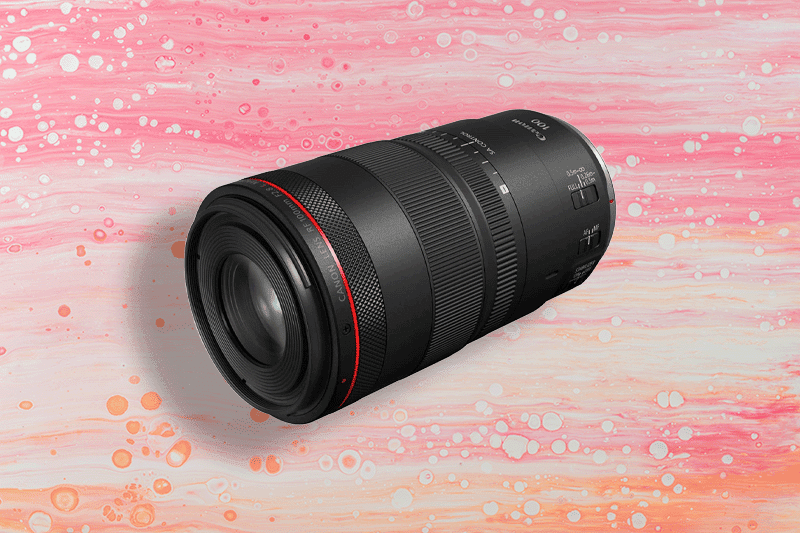
If you’ve been looking for the best macro lens for Canon EOS R6 cameras, the Canon RF 100mm f/2.8 is here to let you get up close to the best that mirrorless cameras have to offer.
Macro photography has been taking the world by storm. This is an exciting frontier for photography that lets us get closer than ever before to some of the smallest things we encounter in our daily lives. If you’re looking to take close-up shots of insects, small animals, and even day-to-day items, macro photography is exactly what you’ve been looking for.
Your selection for macro lenses for the Canon RF mount are currently a little limited. Canon has just started rolling out a range of macro lenses for their new mirrorless mounting system, but they started off on a strong foot.
The Canon RF 100 mm macro lens has a 1.4 magnification, Hybrid Optical image stabilization, weather sealing, and every other feature you would look for in a solid macro lens. The minimum focus distance is a phenomenal 10.2 inches which let you get just about as close as any macro lens will allow.
This lens also comes with a few quality-of-life features that were nice to see. The optional tripod mount ring solves a major problem when it comes to mounting larger macro lenses and keeping them stable. The control ring also gives you an additional range of options when it comes to you staying in command when getting up close too difficult to capture subjects.
This lens also comes equipped with a bright f/2.8 aperture as well as the weather-sealed body. This means you’re free to get up close without worrying about losing so much light or damaging this professional camera lens.
This one also has a 9-blade diaphragm which means that you can do one of the most interesting things that a macro lens can accomplish. This lens is great when it comes to doubling as a portrait lens.
Now we need to take a look at a few of the downsides that come with his lens. That 1.4X magnification could be a little better and is definitely outclassed by some competitors not currently on the RF mount.
Canon has been playing catch-up in the world of mirrorless photography, and it seems like their macro lenses aren’t quite up to speed when compared with competitors like Sony.
However, Canon’s lenses are still the best of the best and if this lens is any indication, they’re going to be on top of the macro lens game soon enough.
Pros
- 1.4x magnification
- Autofocus
- Hybrid Optical Image Stabilization
- f/2.8 to f/32 aperture
- Weather sealed
- Outstanding 10.2-inch minimum focus distance
Cons
- Magnification could be better
- Outclassed by some competitors
5. Canon RF 15-35mm f/2.8 L IS USM Lens: Best Wide-angle Lens for Canon R6
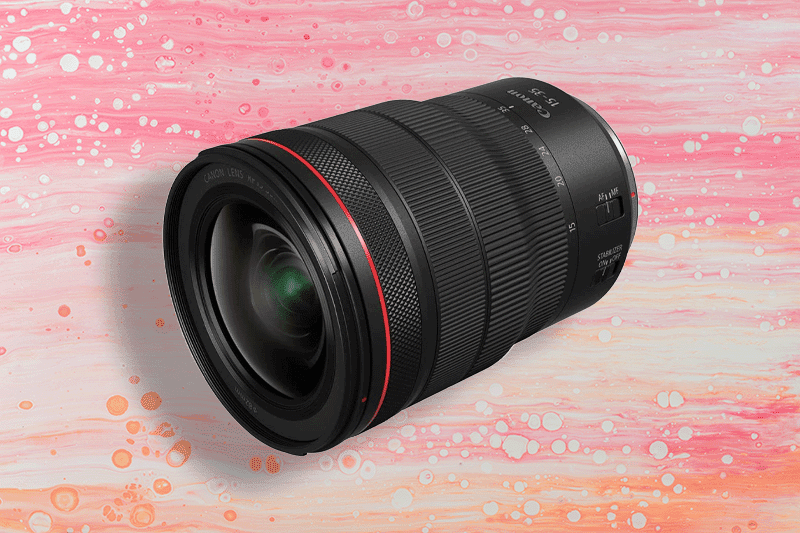
Sometimes, the best Canon EOS R6 lenses are specialized for certain styles of photography. This lens is the ideal choice for shooting at wide-angle because not only does it cover everything from ultra-wide to a film 35mm.
The Canon RF 15 to 35 mm lens is easily the best choice when it comes to shooting at a wide-angle on Canon mirrorless cameras.
We’re going to start off with the construction of this lens because it really stands out. You can tell right off the bat that this lens is going to have excellent specs because it’s a Canon L-series lens. This means it has a weather-sealed body and top-notch construction.
It’s also got three aspherical elements to ultra-low dispersion elements, fluorine, and an air sphere coating. This is going to help you mitigate all of the distortion that you can encounter when shooting at ultra-wide angles.
Speaking of the angles that this camera can get, it’s not all about that 15 mm ultra-wide side. The 35 mm top end of this lens also has some pretty unique capabilities.
This means that you can double this lens as a street photography lens, shoot some portraiture, or even use this lens for video.
Don’t dismiss this as a great first lens purchase. It’s got plenty of great all-around options that you can take advantage of.
Image stabilization is incredibly important when you start shooting at ultra-wide angles. Landscape photography has a lot of detail, and you risk blurring those subtle aspects of your photography without a good image stabilization system.
Canon has brought its best to bear on this lens, and it features one of the tightest image stabilization systems Canon has yet to develop.
Now we need to talk about a few downsides. No lens is perfect, and this lens certainly has a few features that could be a little better.
The first thing you’re going to notice is that this lens has a high price tag. This is exactly what you’re going to expect with an L series lens, but it is worth pointing out is a drawback.
This one also could have been a little bit wider than 15 mm. Since its shipping as an all-in-one choice for wide-angle photography, the extremes could have been a little bit more, well, extreme.
Pros
- 3 aspherical elements, two Ultra-Low Dispersion elements
- Customizable control ring
- Fluorine and air-sphere coatings
- Could also double as a good option for the best video lens for Canon R6
- Weather resistant sealing
Cons
- High price tag
- Could go a little wider and have been a one-lens choice for any wide-angle shot
6. Canon RF 85mm f/1.2 L USM DS Lens: Best Prime Lens for Canon EOS R6
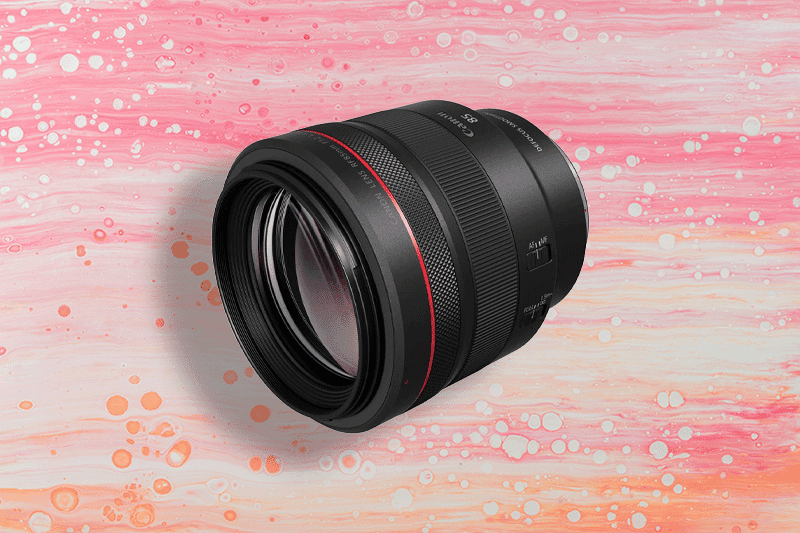
The best prime lens for Canon EOS R6 cameras is easily the Canon RF 85mm f/1.2 lens. This has everything you want to see in a prime and is purpose-built for portraits.
A great portrait lens is all about delivering on smooth bokeh in any shooting condition. This lens features a Defocus Smoothing Coating which allows you to get outstanding bokeh even when shooting at wide apertures.
This one also features a 9-blade and diaphragm which combines with the Defocus Smoothing Coating to deliver some of the best bokeh that Canon has ever delivered. If you’re planning to specialize in portraiture, this is the best lens that you can get for Canon’s line of mirrorless cameras.
The lens also features a Blue Spectrum Reactive Element. This essentially eliminates chromatic aberration which adds finer detail while removing unwanted optical noise from your photography.
We should also talk about how 85 mm is one of the best choices for a prime lens. This is the best option for portraiture and if you’re looking to specialize, or start a professional career, picking up an 85-millimeter prime lens is 100% the right call to make.
This lens was also designed for a lightning-fast and whisper-quiet autofocus. This is vital if you’re working with portraiture subjects that need to stay focused and not get distracted by you trying to focus the camera.
This lens uses a Ring-Type Ultrasonic Motor that pairs with Canon’s new focusing algorithms to get your Canon in focus quicker and quieter than the previous 85 mm prime lenses from Canon. This makes it a natural choice when working in studio settings and even an interesting option for video.
There are a few downsides to this lens that are worth pointing out.
Remember the Defocus Smoothing Coating we talked about earlier? That only gets results up to f/3.2 based on community testing. This means you won’t get as much mileage out of that feature as you’d probably hope to.
This also isn’t going to be the best choice for a first lens. It’s a highly specialized piece of glass that is designed to deliver on portraits first and foremost.
If you’re not looking to specialize in portrait photography, or this is your first lens, and you need something more versatile, you’d be much better off picking one of the other lenses on this list.
With that said, this is easily one of the best lenses that Canon has made when it comes to a dedicated portraiture prime lens.
Pros
- The best portrait lens available for Canon mirrorless cameras
- Defocus Smoothing coating
- 9-bladed diaphragm
- Blue Spectrum Reactive element
- 85 mm is a great choice for a prime lens
Cons
- Costs more than a new R6
- Better off getting a zoom as a first lens
- Defocus Smoothing is less effective than it should be
Conclusion – Which Lens Should I Buy for My Canon EOS R6
We’ve gone through all the best lenses for Canon EOS R6, but our absolute best pick has to go to the Canon RF 24-105mm. It’s budget-friendly, feature-packed, and a great choice for your first Canon EOS R6 lens!
If you’re looking for something a bit more specialized, you could pick up the Canon RF 70-200mm for one of the best telephoto zoom lenses on the market today or the Canon RF 15-35mm which handles just about any wide-angle photo shoot with ease!
Let us know which lens makes your top pick for the Canon EOS R6 and check out our other articles to find the best lenses for any camera.

